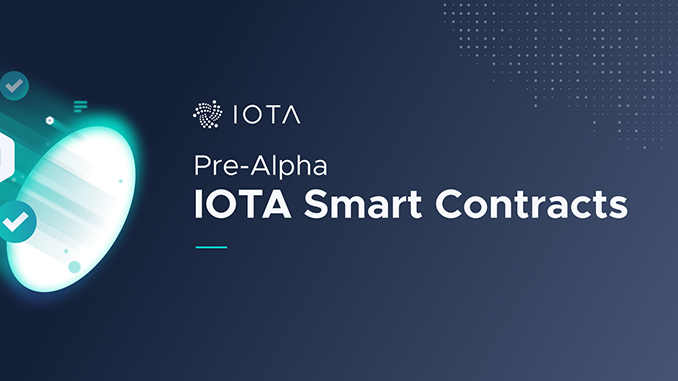
IOTA is making progress in integrating smart contracts into its own ecosystem. It is said that this project is in the “pre-alpha” phase. At the same time, three simple examples of Smart Contracts were published by IOTA.
As is well known, IOTA is in a phase of fundamental technological renewal. The Tanglenet is to become faster and the central coordinator is to be replaced by a decentralized principle. But IOTA 2.0 must also be upgraded in terms of functionality and from the user’s point of view, Smart Contracts plays a central role in this. Now the IOTA Foundation reports via blog post that the development of IOTA Smart Contracts has reached a stage where it is possible to go public with first examples.
Background on Smart Contracts at IOTA
“Pre-Alpha” is what IOTA calls the development status now achieved for Smart Contracts. Up to now IOTA is not able to handle complex Smart Contracts in its Tanglenet and the actual implementation can only be expected with Coordicide aka IOTA 2.0 – according to the current schedule not before summer 2021. IOTA conceives Smart Contracts as decentralized applications in a sidechain of the main net to relieve the actual Tanglenet.
Three simple cases for IOTA Smart Contracts are now shown:
- DonateWithFeedback: Here a typical situation in the online world is used as a scenario: A website wants to be able to accept donations (in IOTA) and also receive comments. This is made possible by a Smart Contract, which also allows to respond to comments and redirect donations to other wallets.
- TokenRegistry: A tool for issuing and organizing “colored tokens” based on a smart contract is provided here. With “colored token”, IOTA will in future allow tokens whose use is limited to a field defined by the issuer and thus basically promote private sidechains. TokenRegistry records the number of individually created “colored tokens”, their owners and additional metadata.
- FairAuction: Creates the option to offer colored tokens by auction with a smart contract. This allows auctions to be held for theoretically all asset classes whose values can be represented by tokens. This is just as interesting for games as it is for other cases from real estate to stocks and capacities.
IOTA has released the examples in the Testnet Pollen as demo and with the wallet (Wasp Wallet) also a wallet for this environment. In order to create Smart Contracts itself, however, the release of a virtual machine that supports Rust as a programming language is still missing.
Conclusion: IOTA with slow progress
Smart Contracts are an essential prerequisite for the DeFi boom. But IOTA, too, urgently needs smart contracts for its orientation towards the Internet of Things (IoT), because without them complex chains of actions can only be realized in a roundabout way. IOTA Access, for example, as a platform for business models, is hardly practicable without smart contracts. So once again, the expert audience is turning its attention to the timetables of the IOTA Foundation: the conclusion of IOA 1.5 has just had to be postponed. IOTA 2.0 with Smart Contracts is scheduled to go live sometime in 2021, where experts are waiting for the launch of Nectar as the second testnet after Pollen. Whether patience pays off with IOTA remains open. Competitors such as Ontology (ONT), NANO and Hedera Hashgraph (HBAR) are already implementing smart contracts as a matter of course.
Best place to buy Bitcoin:

Leave a Reply